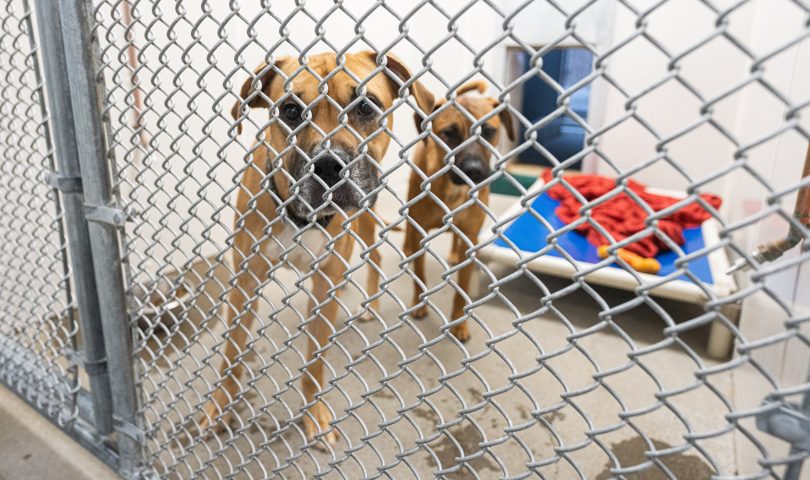Each year, the Monongalia County Canine Adoption Center (MCCAC) takes in over 1,000 potential pets with the hope of finding them forever homes. In a perfect world, they all would.
For the past 20 years or so, the number of animal intakes at the county animal shelter have been declining. In 2020, just over 1,100 animals were taken in compared to over 2,300 in 2010 and nearly 2,500 in 2000.
Sadly, 2022 did not follow this trend, with approximately 1,637 animals admitted throughout the year.
And so far, 2023 is not starting off much better.
According to MCCAC Director Dana Johnson, in just 16 days — between Dec. 21 and Jan. 6 — the shelter has taken in 91 animals – 54 dogs and 37 cats.
Johnson said the chaos of the past few years makes it hard to know what the “normal” number of intakes should be, and it is difficult to pinpoint an exact reason for the sudden increase, but it is likely attributed to a combination of factors. COVID, policy changes at surrounding county shelters and, on a slightly positive note, people being more willing to report potential animal abuse situations out of concern for the pet may all play a part.
Whatever the reason, shelters across the nation, and the state, are finding themselves with kennels full. Many have had to suspend intakes until animals are adopted or fostered out and more room is created.
Information on the dogs and cats available for adoption at MCCAC and how to adopt can be found on their Facebook page, Mccac Shelter, facebook.com/MonCountyCanineAdoptionCenter or by contacting them directly at 304-291-7267.
Animals can end up in the shelter for a variety of reasons, but the majority find themselves there because their owners gave them up, they were found as a stray, or they’ve been removed from a situation by police and animal control.
Of the roughly 595 dogs brought to MCCAC in 2022, nearly half of them were owner surrenders, at 268. Strays accounted for 243, and around 75 were removed by law enforcement and animal officers.
Of the 1,032 cats admitted to the shelter last year, 604 were brought in as stray, 397 were owner surrenders, and 25 removed.
Many of these animals are able to be rehomed by either the shelter itself, or one of the area rescue groups that assist the center with animal adoptions.
Johnson said groups like Mountaineers for Mutts, Animal Friends, Appalachian Peace Paws, and several others are able help find new homes for hundreds of animals from the shelter. In fact, local rescues assisted the county shelter with well over 800 of last year’s adoptions.
But while MCCAC staff were able to see all of those animals — as well as 214 adopted directly from their facility — leave the shelter safely, they also had to make the tough decision to humanely euthanize over 550 of those who ended up in their care. That’s nearly100 more than 2021.
There are many factors that could contribute to the decision to euthanize, but Johnson said it’s often because the dogs weren’t socialized before they wound up at the shelter. And that can make all the difference in a dog’s future.
“We do feel like the extra amount of euthanasia has a lot to do with the fact that people did not socialize their dogs.
“Seriously, take it to a daycare and let it play. Socialize, socialize, socialize. Because if they end up in a place like this and they can’t share a kennel, they can’t stay,” she explained.
Not only do they need socialization for the sake of the other dogs in the shelter, but also for shelter workers to be able to safely put them into the population with people.
MCCAC employees are not only tasked with these decisions and with the full operation of the shelter, they also serve as Monongalia County Dog Wardens and Animal Control Officers enforcing all city and state laws regarding dogs.
On duty 24 hours a day Monday through Friday, they are called for everything from reports of dogs running at large to the most horrifying animal abuse and neglect cases imaginable. On weekends, animal control calls need to be placed to 911 and if a dog warden is needed, police can call for assistance.
Johnson said despite the mental toll the job can take on staff, there are several dog wardens with 13 years under their belt and others with years of experience. She herself has pushed on with the mission for the past 23 years.
She said most dog wardens keep the position an average of eight years so she is thankful for their dedication day in and day out and is beyond proud of the work they do.
The best way to keep your furry family members from an unwanted encounter with a dog warden is to follow county and state animal control laws.
“Dog [tax] tags and rabies tags are required by law,” Johnson reminded. Mon County also has a leash law or “running at large” law.
“So running at large just means once it leaves your property – it doesn’t mean it has to be on a tie on your property,” she said. “You can have an underground fence, you can have a dog trained to stay on your property, but once it steps off your property on the road you’re breaking the law.”
Johnson said MCCAC also encourages anyone who sees something suspicious involving an animal to call them at 304-291-7267 or to call 911. “Even if it doesn’t check out, even if it’s bogus, we don’t care,” she said.
“The most important, I think, is that people have the general knowledge that if you can see five rib bones, you need to call me. If you can see two hip bones, you need to call me,” she said. “Call us so we can at least check.”




